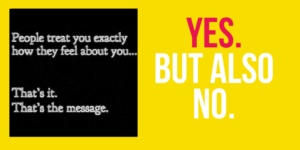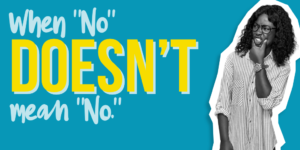Oh, I feel you.
Deeply.
In my core.
I’m a direct person, and because of the way my brain is put together, I miss a lot of subtlety. I mean, it’s SOOOO much easier for me if you just say what you want and need, so that I can respond.
And honestly, I usually get that from those I hold close to me. They’ve learned how to communicate with me best and it makes them happy to do so—win win!
However, not everyone is willing or able to change that aspect of themselves, and frankly, the world is a more wonderful and varied place because of it, so what can we do if we just don’t understand subtlety?
First, I think it behooves us to try to learn to pick up signals that something is amiss.
Notice, I didn’t say wrong.
Yes, we ought to try to look for signs something is wrong as well, but it’s not just “wrong” we’re looking for. It’s anything out of the ordinary.
They may be suppressing the desire to tell us about their amazing day, but want to be sure we want to hear by asking about it, for example.
So, look for those signs.
Then, ask questions:
- Is there something you’d like to tell me?
- Is there something I should know?
- Is there anything wrong?
- How are you feeling?
- Is everything OK?
General, and not accusatory language allows them to choose whether they are ready to open up or not.
If your partner has a hard time opening up, there are things you can do to help make that happen. For now, it’s about making the offer.
When they do say something, make a note of what they said and the expressions or behaviors that led you to that information for next time, so that perhaps you’ll recognize their signals more quickly and more accurately.
Please understand that in my view, this very much falls under the heading of “Doing things that I think will make them happy and healthy and feeling loved is ME.”
However, if I fail to do this because I am not wired that way, it is not something I will take responsibility for. If my partner cannot find a way to communicate with me in a way I understand them, and I am not a mind reader (I am most decidedly NOT), then what we got here is failure to communicate. [https://www.youtube.com/watch?v=FqAssSazWvY]
But WHY can’t they just be more direct?
Well, there are lots of potential reasons.
Maybe they were raised in a culture where asking directly for something is considered uncouth and rude.
Maybe they’ve been negatively reinforced when they’ve asked for things for themselves in the past.
Perhaps their fear of not getting what they want makes them feel like not directly asking for it might lessen their pain.
Whatever the reason, I think it’s important to keep one thing in mind as you navigate this:
You have them in your life for a reason, and it’s worth working your way towards them as you encourage them to work their way towards you.
Two Types of People
And two VERY different ways of looking at things. We all do some of both, but some people are much more inclined towards one or the other, and many tend to view their non-dominant processing style as suspect, somehow.
Low Context People
Let their words speak for themselves. Prefer to be more direct, relying on what is explicitly stated in their speech. Low contexters, by nature, tend to be ‘I think’ people. They will say what they mean, wanting to be as clear as possible.
High Context People
Recognize (and routinely use) implied messages, aware of the verbal and nonverbal cues that let them understand the speaker’s meaning. High contexters, by nature, tend to be ‘I feel’ people. They will rely on people picking up on non-verbal cues, like they do.
The two styles can have a difficult time communicating, because low-contexters say what they mean, and are often baffled when others read so much more into their statements than what is said (see image above). high-contexters are subtle, and get frustrated when what they say is not received, when they feel like they have “said it over and over.”
As a low-context person, I have said something like, “I really like you and enjoy your company. I’d love to see more of you, if you’re open to it,” then heard later that the person I said that to was trying to figure out what I meant.
Huh?
I thought I said it.
### Two MORE Types of People
Let’s say you and I are friends on social media. We may be. And you live somewhere I’m planning on traveling.
Now, let’s say that I’ll be there for a few days in early April, and so, I reach out to you, and say
“Hey! I’ll be in your area, and I was wondering if you’d like to get some people together to meet for dinner? If not, no worries, I just love meeting people when I’m in a new town.”
Would that feel rude to you?
How about another example. You and I have been talking about this party you’re attending later in the month. I ask you who’s going to be there. I say:
“Wow, that sounds like fun!” I mention that I haven’t made plans for that night.
In other words, I beat around the bush, hoping that you will possibly invite me, and you recognize this.
Would that feel rude to you?
It’s a case of Ask Culture versus Guess Culture.
In Ask Culture, it’s about being direct. You can ask for anything, and accept whatever answer comes your way.
So, don’t ask me no questions
And I won’t tell you no lies
— Lynyrd Skynyrd, https://www.youtube.com/watch?v=EKbkArYyics
Guess Culture is more subtle. You don’t ask for something unless you’re pretty sure the answer is going to be yes, and when you have to go through the pain of saying “No,” you resent the question that forced the issue.
I am Team Ask.
When people say, “May I ask you a question,” I respond, “You may ask me anything. I may choose not to respond.”
I prefer when people are direct, especially people I don’t know well, as I don’t want to try to read their body language to guess what they want from me. I also prefer a direct reply to any question I have, as guessing what a vague response means is not my idea of a good time.
I really annoy Guess people.
And I don’t mean to.
By being direct, and simply asking a question, I can make them feel uncomfortable.
I don’t mean to.
It doesn’t hurt me when someone says “No.” It took me a long time to realize that it hurt THEM.
They don’t want to have to say no.
For some, it’s physically painful.
And to ask a question that they may get rejected for? Unthinkable. Horrifying. Not gonna happen. They feel that stress when others ask them a question that is not an automatic yes as well.
They feel bullied and pushed and crowded, and us ask people are none the wiser.
Can you want/be both?
Yes. Well, maybe.
In reading about this online, I saw someone suggest that the less-intimate the relationship, the more “Ask” you ‘should’ be, since there is no way to be sure if another is ask or guess.
But, isn’t that the same thing as telling someone that who they are is OK, as long as they aren’t that way when it really matters?
It’s OK to be gay, as long as you only do that with others you know are OK or are OK with you being gay, but if you don’t know, be straight, just in case.
That sounds pretty not-cool, put that way.
So, what is the solution?
Well, I have found that there are two things I can do that have worked in my life:
First, Be Aware
That’s simple. Just understand that there are Ask people and Guess people, and that there is a spectrum as well. Someone may be very Ask in most situations, but when it comes to something a bit more emotional (dating, maybe), they might wait until they feel guaranteed of a “Yes.”
Know Thyself
Working with people, you may find that you have to make allowances for all different types of communication. Be aware, and work on meeting other people halfway.
In your personal relationships, you may prefer a very specific type of communication. For me, if a person cannot ask me out on a date, or ask me for what they want in the relationship, the relationship will not go well. I know this, so I educate my potential playmates and lovers accordingly. When I see a lot of Guess behavior, I choose to bow out, because I know my personal style will not mesh well with that person on a long-term intimate basis, and trying will likely frustrate or hurt us both.
Know your skills in both short term situations and long term.
So, I hope I’ve given you food for thought…
…on why some people might be more direct than others, and what steps you could take to meet them halfway, if you’re trying to build a relationship with them.
What do you think?
Are you low context or high context? Ask or guess? Does the “other side” annoy you? Do you annoy them? 🤣🤣🤣
What changes have you made in your life to communicate more effectively with others?
—
This writing is take from Understand Me Know—And That’s An Order, my book on communication. smiles









